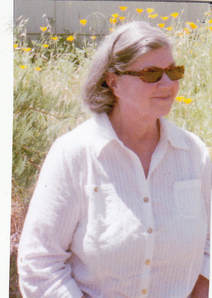 Sherrill 2011
Sherrill 2011
Our doorway to Europe, and other destinations, from time to time, was London. Often, either before or after continuing on, Sherrill and I explored the big city and went to a play and a museum or two, depending on how much time we'd allowed ourselves. After our mop-up trip to southern Europe, we indulged in a couple of days in the great gray city. Wonderfully imperfect as it was, we never got enough of it.
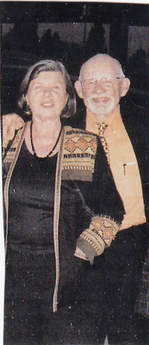 Sherrill & Bruce, London 2011
Sherrill & Bruce, London 2011 "I'm always careful. I haven't got mugged or killed yet."
"Well, see that you don't. And don't lose your passport or anything else."
"It's all under my clothes."
"Don't lose those, either."
I kissed her goodbye and left, walking from our hotel down the hill to Paddington Station a block and a half away, where I boarded an Underground train (very crowded, because it was the weekend) to Charing Cross at Trafalgar Square, planning to walk from there. Busy gazing into store windows, admiring the old buildings, watching double-decker red buses and tall black cabs pass by, sometimes I forgot to walk on the British side of the sidewalk, weaving carelessly among the rushing bodies. Suddenly, two or three crashed right into me, almost shoving me into a red post box. They were young, I saw, stumbling ahead laughing along the busy sidewalk, apparently not caring who they bumped into.
Or was it on purpose, I wondered? Discreetly, I felt for the shape of my valuables under my clothes. Still there—not that I expected them to be gone, but you never knew. Pickpockets could be very clever and skilled, as I'd learned in Italy.
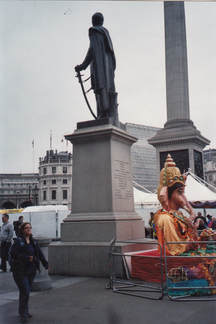 Ganesh in Trafalgar Square, London
Ganesh in Trafalgar Square, London I was pleased to see that London had decided to recognize its large Indian population in this way. A large flower-bedecked figure of Ganesh, the elephant god, sat serenely at the base of Admiral Nelson's column, his trunk resting with self-satisfaction on his big belly. A few hours later, when Sherrill and I passed by again, a security guard told us that sweets, food, and drink would be on offer later—plus live entertainment.
"Come back," she grinned, a gap between her two front teeth. "Check it out."
From Trafalgar Square, I set out to walk along The Strand to St. Paul's Cathedral. The sky was darkening as I passed the shiny silver marquee of the Savoy Hotel and Theatre, then other theatres, a Boots drug store and other stores, restaurants, and fast food cafes. Gradually, the avenue grew less crowded as I reached Fleet Street and the ornate buildings of the old newspaper offices and the massive Victorian blocks of the courts and legal buildings. Down one alley, in the midst of all this, I remembered, was the little house where Samuel Johnson worked on his famous dictionary. Most of the big newspapers had moved to other parts of London and no longer were produced here.
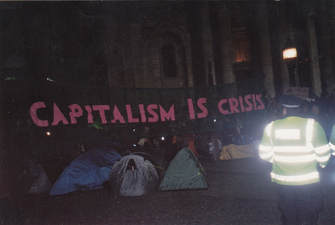 "Occupy Bank of England" camp, London, 2011
"Occupy Bank of England" camp, London, 2011 Finally, I reached the old financial district. Although even in 2011 many of the great banks and financial institutions were busy building new headquarters out in the fast growing East End/Canary Wharf area of London, the general public still thought of this district as the financial center of England and the empire. Eight mounted police clopped past in the Day-Glo greenish-yellow vests that they all seemed to wear then. I was sure, odd as it seemed, that I heard a lone trumpet playing in the distance, maybe one of protesters.
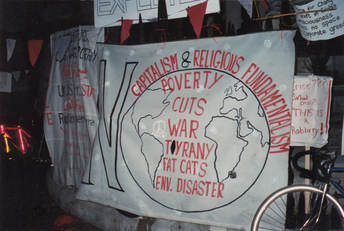 "Occupy" movement posters, London, 2011
"Occupy" movement posters, London, 2011 Around the Queen Anne monument directly in front of the cathedral flapped handmade signs, posters, and banners protesting the corruption of big business and the financial industry. On a large black and white drawing of the earth was neatly printed in scarlet capital letters: CAPITALISM & RELIGIOUS FUNDAMENTALISM = POVERTY, CUTS, WAR, TYRANNY, FAT CATS, ENVIRONMENTAL DISASTER.
CAPITALISM IS CRISIS proclaimed the largest banner, red letters on black.
RESPECT EXISTENCE insisted another sign, OR EXPECT RESISTANCE.
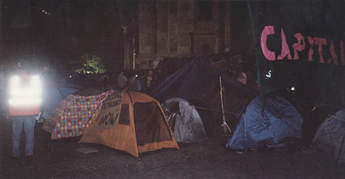 "Occupy" camp in front of St. Paul's Cathedral, London, 2011
"Occupy" camp in front of St. Paul's Cathedral, London, 2011 I walked around the area, watching and listening, and took a few photographs, myself. An idealism that I hadn't seen for years hovered over the steps and square. I remembered Berkeley in the late nineteen-sixties and early seventies. The innocence of those young people soon collided with an establishment that refused to hear their pleas. I saw it happen on the University of California campus and on Telegraph Avenue and in People's Park. My daughter and I had even been sprayed with tear gas as we crossed the campus. Protestors were injured, one blinded by a gunshot. However, I felt optimistic that violence could be avoided here. This was, after all, civilized London, where people simply didn't behave like that.
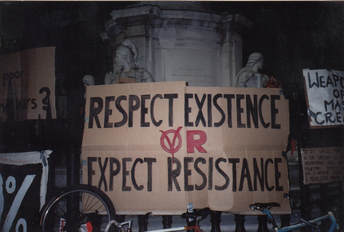 In front of St. Paul's, London 2011
In front of St. Paul's, London 2011 "How long will we stay?" replied one young man. "That's the million pound question, isn't it? It'll be hard in the winter, but hopefully we'll stay 'til we get our message across." His gravelly voice sounded both sincere and sentimental. He was very young. "All this and the other occupations in the UK were inspired by the protests in America."
"The bankers gambled with the economy," interrupted a friend with him.
"The financial system is unjust," added a young woman. "I have a student debt of 20,000 pounds. But the police here are great. Some of them are showing a real interest."
One man in a suit, maybe fortyish, said he had "quite a lot of sympathy for their message."
Eventually, I walked back out Fleet Street to the Strand, now much quieter than it had been just an hour earlier. On the way, I passed a dark van parked at the curb, from the back of which three people were handing out cups of hot soup to several dozen street people and unemployed who had gathered for what apparently was a nightly ritual. Silently, as if in a scene from a nineteen-thirties Depression movie, they shuffled up to get their steaming cups of soup.
Sweating a little by now, I continued on, past Trafalgar Square, now quiet except for a few people dismantling the remains of the Diwali festival, and walked up the Haymarket, past the Theatre Royal, where a somber poster of Ralph Fiennes as Prospero stared out at the street, and on to Piccadilly Circus, now almost as busy and loud as it had been on Saturday night, when Sherrill and I ate there before going to a play. This was a world quite different from around St. Paul's Cathedral. Here, everyone still seemed intent on having a good time.
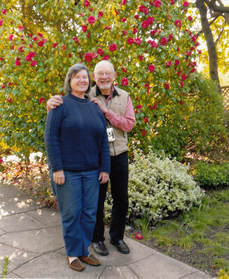 Sherrill & Bruce back home in Berkeley
Sherrill & Bruce back home in Berkeley Finally, back at Paddington, I decided after my long evening and walk to stop at a pub. The Dickens Tavern near our little hotel was like stepping back in time—not to the nineteenth century, despite the black and white Victorian prints on the walls, but to the nineteen-fifties or sixties. The big-bellied pub keeper moved with pleasantly jovial efficiency behind the long bar, taking orders and dispensing beer and other drinks. Football (soccer, of course) played on the television (now flat screen).
"You didn't get mugged!" Sherrill exclaimed from the bed, as I walked into our tiny third-floor hotel room a little later.
"Or killed."
"Okay, tell me all about it."
The next morning, Sherrill and I rode the Heathrow Express from Paddington Station to the airport. The occupying camps and protests continued in London, New York, San Francisco, Berkeley, and other cities. The protesters all seemed to really believe that they'd have such an impact that right would defeat might and the power of the banks and corporations would suffer and the world would change forever.
To be continued....
Please pass the posts on to anybody else you think might enjoy them.
 RSS Feed
RSS Feed